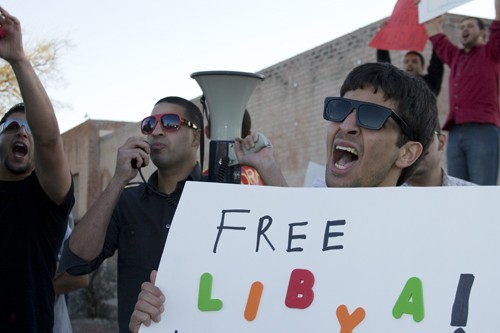About 60 people gathered yesterday to protest the current unrest in Libya and call for the downfall of its entrenched authoritarian leader, Col. Muammar el-Qaddafi.
Protesters in front of the First Christian Church on the corner of Speedway Boulevard and Euclid Avenue bore signs that read “”Free Libya,”” “”Honk for Freedom,”” and “”Silence breeds violence.”” Drivers stopped at the traffic light, leaned out of their windows and shook hands with those gathered on the sidewalk.
Protesters bore signs that read “”Free Libya,”” “”Honk for Freedom,”” and “”Silence breeds violence,”” imploring those driving by to show their support. People stopped at the traffic light leaned out of their windows and shook hands with those gathered on the sidewalk.
A car drove by and the driver held its horn for several seconds, sending those gathered into an uproar.
Abdul Fellah, an instructor in the Department of Science and Mathematics at Pima Community College who helped organize the protest, said everyone was gathered there for one reason.
“”Freedom, that’s all this is,”” Fellah, who was born in Libya, said. “”It’s the freedom to express ourselves.””
Aman Tekbali, a UA senior studying history and Arabic, said the protest was about building awareness and trying to spur President Barack Obama to take a more definitive stance against Muammar al-Qaddafi, who he called a “”war criminal”” with a human rights record that is “”as bad as Saddam Hussein.””
Tekbali, whose mother and four siblings are in Tripoli, the Libyan capital, attended school in the country.
“”I’ve seen firsthand how brutal this regime can be,”” Tekbali said.
Tekbali said he also had an uncle jailed in the country, and had visited him in prison in 1995.
“”It’s a depressing place,”” he said. “”There are no wealthy people, there are only those who have some money and those who have none.””
Fellah said the protest was about alerting the Tucson community to the plight of those in Libya.
“”We need to let them know that Libya has been in torture for the last 42 years,”” Fellah said. “”They need to know that finally the Libyan people have spoken.””
Qaddafi first came to power after a military coup in 1969. His longer than 41-year rule makes him the fourth-longest tenured non-royal ruler since 1900, behind only Cuba’s Fidel Castro, North Korea’s Kim Il-sung and Gabon’s Omar Bongo.
Qaddafi has been battling violent internal protests that erupted on Feb. 15.
The humanitarian organization Human Rights Watch has confirmed at least 233 have been killed during the uprising as of Feb. 22. It is estimated that seven Libyan cities are in the hands of anti-government demonstrators.
Fellah expressed his desire to see Qaddafi “”brought to justice”” for his crimes against humanity.
His brother, Jamal Fellah, echoed the sentiment.
“”We need Qaddafi to go,”” Jamal Fellah yelled, barely audible above the din and clamor of the crowd. “”We need to bring him down.””









